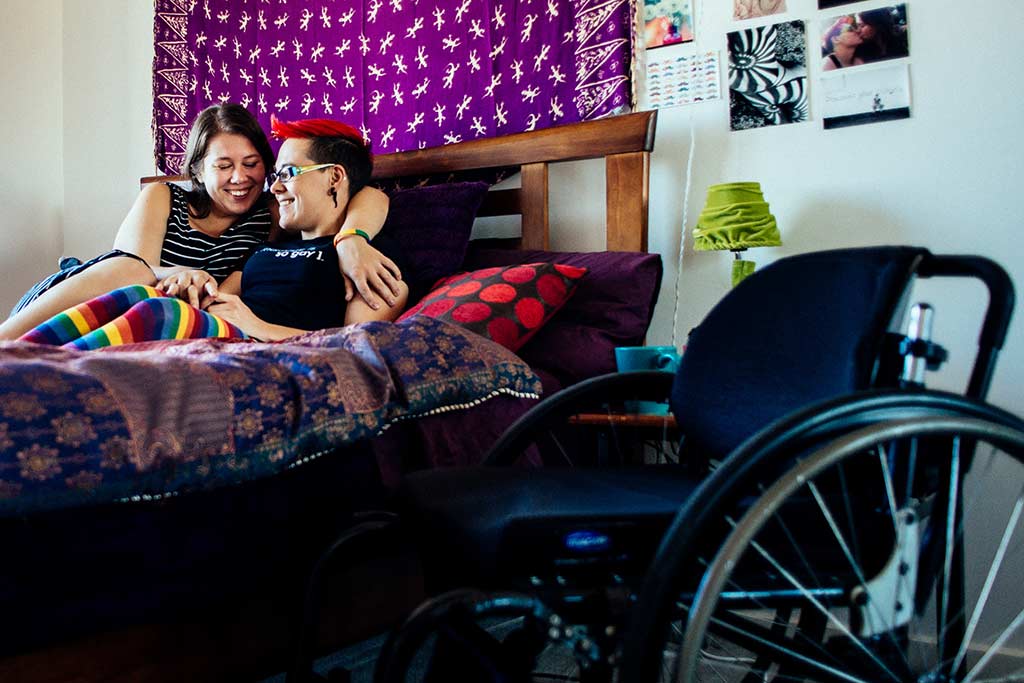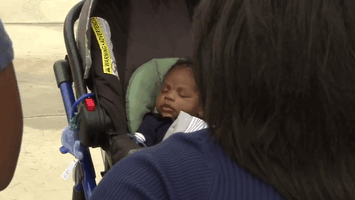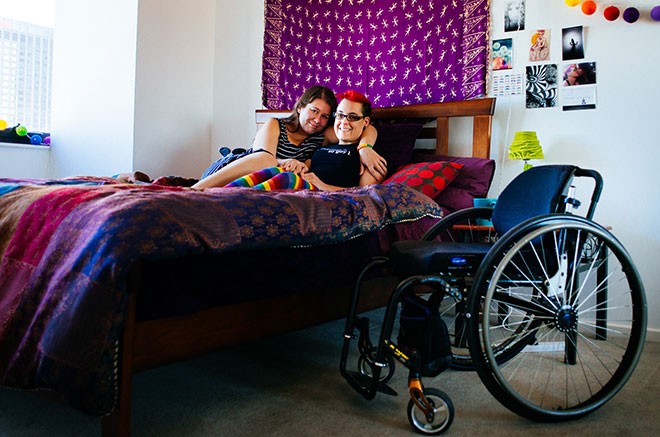Australia’s Coming Around On Same-Sex Adoption, But Will It Ever Happen For People With Disability?
The state says people like me are not "fit and healthy and able to actively parent a child". We're not equal yet.

In November we held our first youth unconference, JUNKET. Over the coming weeks we’re sharing thoughts and features from some of our 200 delegates on the topics they raised. This, from Jax Jacki Brown, leads on from discussions around disability.
–
Last week, Victorian parliament passed new legislation to allow same-sex couples to adopt. This was done through an amendment to the Adoption Act; a law which had previously only let them act as guardians or foster parents, even in situations where the couple had been primary caregivers of a child for years. And, though there are still some concerns over exemptions to faith-based organisations, it’s largely been hailed as a huge win for equality.
The passing of this amendment brings Victoria in line with the ACT, NSW, Tasmania and Western Australia which all allow same-sex couples to apply to adopt. It’s been a long time coming and it’s indeed worth celebrating.
#AdoptionEquality has now passed the Vic Parliament and will be law. I couldn't be prouder. pic.twitter.com/9ikDBsPPjX
— Daniel Andrews (@DanielAndrewsMP) December 9, 2015
But when my partner came home from work last Thursday night, we didn’t have a drink in celebration. We didn’t join in the #equality elation because, though we’re in a stable, loving and supportive same-sex relationship, the landmark decision didn’t afford us equality at all. While we may no longer experience this kind of discrimination on the basis of our sexuality, it’s still predicated on my body. I have a disability and I am a wheelchair user which means we’re still excluded. The state deems people like me not “fit and healthy and able to actively parent a child”.
–
The Presumptions And Prejudices Of “Good” Parenthood
Victoria is not alone in assessing applicants’ physical and mental health in the adoption process; NSW, South Australia, ACT and Queensland also use this as a key criteria for eligibility. But there are a lot of assumptions at play when determining an individual’s suitability to parent like this.
While the legislation suggests physical and mental health are necessary to parent, this is based on problematic societal assumptions about what a ‘good’ parent looks like. In Victoria it assumes this has something to do with being “fit”, “healthy” and “active”. It suggests that someone cannot parent well unless they have a body that fits these descriptors, failing to recognise there are many great parents who fall outside one or all of these markers. It also assumes that health is a relatively stable state. We’re all only temporarily able-bodied and can become disabled at any time. None of us know what the future holds.
It is wrong and offensive to imply that people with different bodies and minds can’t effectively parent their children, and that they’re not able to find creative ways to work around problems that may arise. I’m a member of a Facebook group called Wheelie Good Moms featuring mums who are also wheelchair users. They’re constantly coming up with ingenious ways to amend their daily routines including modifications to change tables, cots and strollers to be wheelchair-friendly.

That being said, I do understand why there is criteria for adoption. We, as a society, want to do what’s in the best interest of the child; to provide them with a loving and supportive home and the best possible start to life. However, as these criteria stand, they’re tied up in all sorts of societal assumptions and prejudices not only around health, but also relationships and wealth.
The length of time couples are required to be in a relationship before applying to adopt varies from state to state. In the Northern Territory, NSW, and Queensland the minimum is two years, for Tasmania, Western Australia and the ACT it’s three years, and in South Australia the period is five. All states other then Queensland and South Australia allow a single person to adopt, however in the Northern Territory and Tasmania a single person can only adopt in exceptional circumstances and, in many cases, priority is often given to couples. This reinforces societal judgments on the single parent, and falsely supports the idea that a nuclear family with two parents in one household is the ‘correct’ or best way to provide for a child.
In all states and territories you also have to be in “suitable financial circumstances to adequately support a child”. Though it’s of course important to be able to feed and house your child, equating financial privilege with good parenting is fallacious. There have always been plenty of fantastic parents who provide both love and stability for their child in the face of relative financial hardship. Should the state really be able to legislate otherwise?
–
This Isn’t Just A Problem With Adoption Law
The decision to have children, whether via adoption or biological means, will always be filled with excitement and fear. But, if I did have a child, my worries would be different to that of other first-time parents. One of my biggest fears is that I will not be afforded the same rights to my child as an able-bodied parent. I dread that I’ll be presumed incompetent from the outset and my child will be unnecessarily removed. This fear is not unfounded.
The idea that a person with disability will be an unfit parent can and does lead to higher incidences of child removal. A few years ago, a paper from the Australian Institute of Family Studies found that “parents with intellectual disability are over-represented in child protection and legal proceedings“. “Research suggests factors contributing to this over-representation include discrimination, prejudice and a lack of support services,” it read.
Following a parliamentary committee into the matter this year, disability advocate Fiona May expressed similar concern to the ABC. “Parents with disabilities are often judged on their ability to parent before they can learn,” she says. “Their babies are being taken literally from the hospital, before they’ve had a chance to parent.”
As the Office of the Public Advocate in Victoria recently noted, statistics on much of this are hard to find. “Little is known about the circumstances under which children are removed from the care of parents with a disability through the family law system. It is largely hidden from public and government scrutiny because it is viewed as a private, civil matter within a family”. However, the stories that do eventually come out are heartbreaking.
This year a pregnant woman with a mild intellectual disability had a pre-birth report conducted on her by Victorian Child Protection that raised concerns about her ability to look after her child. “I was a bit shy, I didn’t know my rights and I had a lack of understanding about supports I could ask for,” she told The Age anonymously. “In the end I didn’t fight it … They were telling me I was not the best option for her. I knew I wasn’t going to get the funding [or] support quick enough to properly care for her.” In this case, custody was given to the woman’s grandmother and she now sees the child for two hours per week.
This is consistent with that same report from the Office of the Public Advocate. “Rather than getting encouragement or support to parent their child, the parent comes under intense negative scrutiny,” it reads. “There is considerable evidence that people with disabilities are generally able to successfully parent their children if they are provided with education.”
All this is a poignant reminder of the discrimination and prejudice parents with disabilities face. We live in a society that holds these misconceptions and enacts them unfairly and with impunity. There are significant parallels between the discriminatory arguments and legislation used to deny same-sex couples equal rights to start a family and those currently being aimed at people with disabilities and, as a society, we need to stop letting our fear of ‘the other’ shape our institutions, legislation and social structures.
My partner and I are not ready to have children just yet but one day we hope for a society in which we’re not judged or discriminated against based on my body or our sexualities. If we do have children, we want to raise them in a world that supports and celebrates difference and diversity and provides equality for all.

–
Images supplied via The Social Photographer and originally taken as part of the In Bed Project, “a quiet protest for marriage equality”.
–
Jax Jacki Brown is a disability and queer rights activist, public speaker, writer, spoken-word performer, and co-producer of Quippings Disability Unleashed. She tweets at @jaxjackibrown.